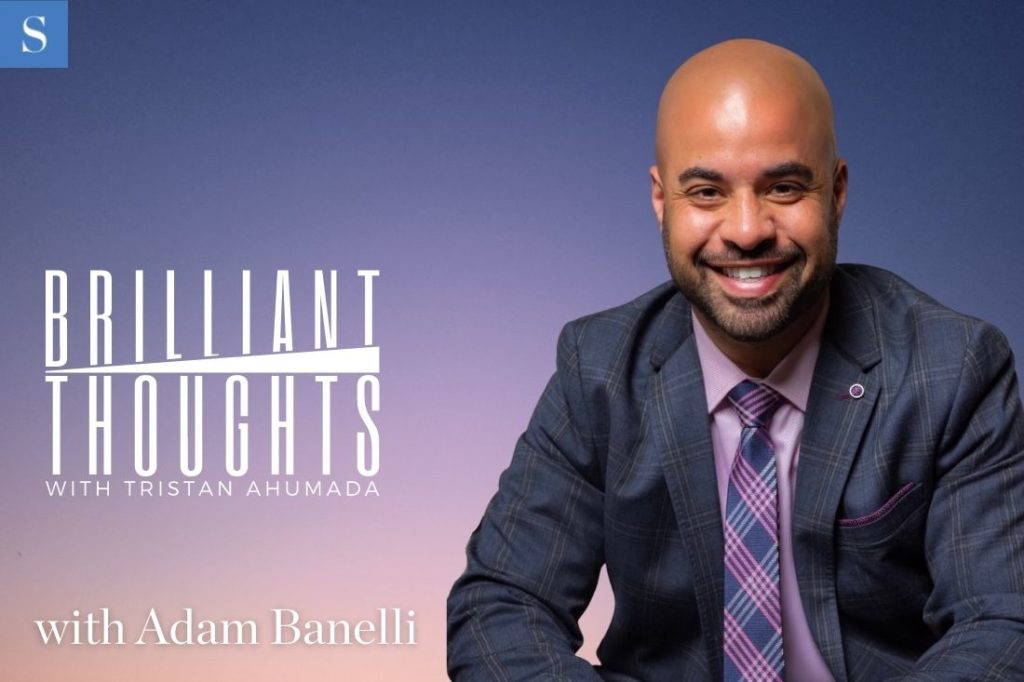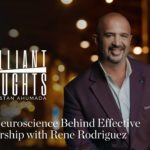Let’s be honest: When you think about what defines a CEO or business leader, empathy and openness probably aren’t the first traits that come to mind. In fact, you probably imagine the opposite—an almost Machiavellian, win-at-any-cost attitude. Although this outlook may yield short-term results, psychologist and author Dr. Adam Bandelli says that it’s actually the ability to build relationships with others that enables long-term leadership success.
“So what we found in the research was that Machiavellian leaders are really good at getting short-term goals done, maybe for a quarter or for six months… but that’s not going to work in the long-term,” explains Bandelli in a recent conversation with Brilliant Thoughts’ editor and host Tristan Ahumada. “Relationally intelligent leaders, on the other hand… because the focus is on building strong, long-term relationships, this idea of intentionality and authenticity is there.”
In his new book, Relational Intelligence, Bandelli explains how developing strong interpersonal bonds—rather than embracing rugged individualism—helps leaders achieve positive outcomes. Drawing on years of research and personal experience, he outlines the essential skills that will teach you how to build life-changing relationships:
Why emotional intelligence isn’t enough.
If you’ve never heard of relational intelligence before, you may be thinking it’s the same as emotional intelligence (EQ). Although both are important, they differ in key ways. Whereas EQ is the ability to understand and manage emotions, relational intelligence is the ability to connect and form strong, lasting relationships. And unlike EQ, it can’t be faked.
“When you think about EQ, it can be used for good or negative purposes,” Bandelli explains. “You can use emotions to elicit inspiration and motivate others, but you can also use emotions to manipulate people, to trigger things like fear or anxiety.”
Relational intelligence can’t be used to negative ends because its very purpose is to bring out the best in people. According to Bandelli, this type of understanding—not EQ—is what ultimately separates a Machiavellian leader from an inspirational one.
Want relational intelligence? Master these 5 skills.
Business people and entrepreneurs have historically measured success potential by a person’s raw intellect, or IQ. In 1995, psychologist Daniel Goleman published a book called Emotional Intelligence, which argued that EQ may actually be more essential to achievement. Bandelli, who was in college when he read this book, found Goleman’s ideas fascinating.
“That started me down the road of understanding and unpacking what EQ is and then into my master’s thesis,” he explains. “When I did my dissertation in 2006, almost 20 years ago, I knew that there were other skills that great leaders practiced beyond just emotions, things like developing trust [and] embracing diversity.”
In his dissertation, Bandelli identified five skills that are critical to relational intelligence, which he details in his recently published book. They are more than just concepts to Bandelli—they are tools he continually hones and applies to his professional and personal relationships.
1. Establish rapport.
To establish rapport, you have to create an initial positive connection with people. A big part of this is understanding yourself because people need to know their own values, strengths and blindspots in order to have authentic interactions with others. Another key precursor to establishing rapport is challenging your assumptions and prejudices.
“For people to really connect with others, you have to look past the way you were raised, or what you were told about black people or Asian people or white people or gay people or straight people,” Bandelli explains. “You have to be able to say, ‘Okay, whoever I’m interacting with is a unique individual, they’re not in a category.’”
2. Make an intentional effort to understand others.
Understanding another person, their unique experiences and their motivations starts with listening, which most people struggle to do well.
“People are always trying to—I don’t want to say prove themselves—but they want to show what they have versus take a step back and ask questions and understand the person sitting on the other side of the table,” Bandelli says. “I think another foundational piece is that most people don’t think with intentionality around relationships.”
Bandelli says it’s easy to put people in roles—whether it’s as a drinking buddy, coworker or family member—and neglect to intentionally grow the relationship. It’s essential to always be building trust, strengthening connections and helping others become the best versions of themselves.
3. Embrace diversity.
With a Christian mother, Muslim father and several Jewish relatives, Bandelli learned early on that exposure to diversity teaches people how to be compassionate and accepting of those who are different from them.
“Growing up, there were weekends where I was with my father in the mosque, and then there were weekends where I was with my mother in the church,” he recounts. “It just gave me a broad understanding that people think and value and believe in different things, and that’s okay—you can still embrace their humanity.”
For people who grew up in a mentality of prejudice, Bandelli suggests exposure through travel. The more cultures you experience, the easier it is to accept that individual differences are natural and should be celebrated.
4. Develop trust.
If you don’t know how you’re wired, you can’t build trust with another person. In a section of his book called “Know Thyself,” Bandelli argues that you need to examine the good, the bad and the ugly within yourself before building an authentic relationship.
“Your ability to understand that then opens the door for you to develop trust in other people, you know,” he says. “We view trust, or we define it in the model, as the ability to be vulnerable and take a risk to be exposed to the actions and behaviors of others.”
The underlying aspects of trust, which Bandelli calls the “five Cs,” are competency, commitment, consistency, character and courage. The best leaders foster all of them in their relationships with team members.
5. Cultivate influence.
Before you cultivate influence, you need to examine your motivations: Are you trying to manipulate and control or inspire? The latter requires real care and intentionality.
“If you want to create the best performance and raise financial profitability, help your people do what they do the best way,” says Bandelli. “You really have to think about putting people and culture first, rather than driving results or getting the sale or trying to meet the short-term goal.”
Having a positive, meaningful impact on others is the best way for leaders to give value to their team and get results from their performances. Through inspiring leaders to prioritize individuals’ well-being over productivity, Bandelli is helping entrepreneurs create a more compassionate and profitable workplace.
Visit Bandelli’s website to learn more about his research and publications, as well as to explore his many leadership development offerings.
Brilliant Thoughts with Tristan Ahumada is no longer releasing new episodes on the SUCCESS Podcast Network, but you can still listen to the full conversation below.












